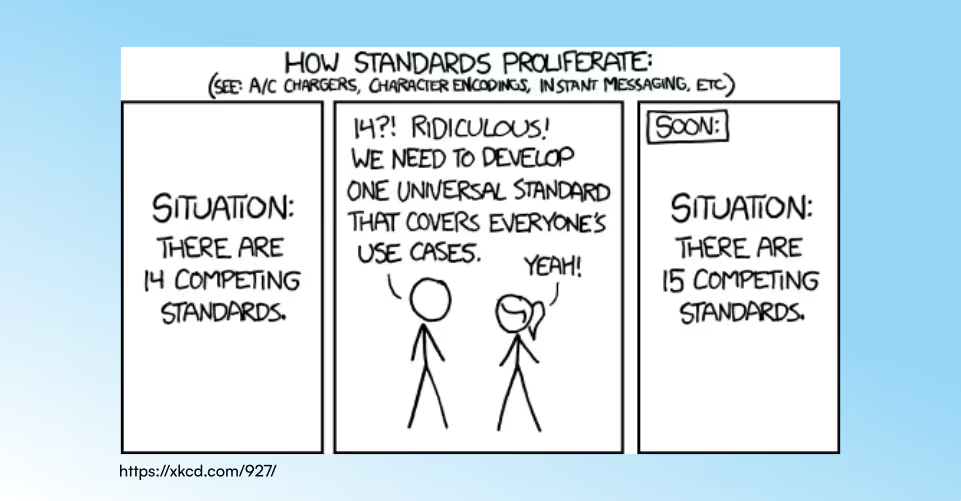Oops, they did it again!


We had a serious case of deja vu when we heard the latest news about yet ANOTHER custom error code standard in the EV charging ecosystem.
Don’t get us wrong, we are absolutely in favor of standardizing error codes! There are so many benefits of standardization; from fostering interoperability and quality assurance, to driving innovation and much more. But the same rules apply to all standards: too many competing standards are counterproductive and run the risk of complicating everything.
EV Charging standards are riddled with complexity already - developing in many directions all at once. It is like herding cats. And the complexity rises with every new standard as standards overlap with one another.
How long do we want to play this game?

Case in point: Germany just released their Industry Standard DIN DKE SPEC 99003 - to harmonize error codes from EV Chargers. This follows the previously published US and Korean versions of their own error codes. All with good intentions, of course. But the resulting lack of harmonization between them has caused Error Code Chaos… and ultimately less standardization AND a worsened charging experience.
C’mon people - think big and work together! We welcome EVeryone to EVerest! ;-)
Each of the following standards address the harmonization of error codes for electric vehicle (EV) charging infrastructure.
DIN DKE SPEC 99003
A German national standard that focuses on defining error codes for charging stations. It aims to standardize how error messages are communicated across charging systems to ensure interoperability and improve maintenance processes so that charging station manufacturers, operators, and service providers use a common language when it comes to diagnosing and reporting faults or errors.
Learn more: https://www.dinmedia.de/en/technical-rule/din-dke-spec-99003/383541627
CharIN (CharIN e.V.) Unified Error Codes
CharIN (Charging Interface Initiative) focuses on global standardization efforts for charging interfaces and infrastructure, particularly for Combined Charging System (CCS) technology, which is widely adopted globally. Part of their work includes developing error codes that unify how EVs and charging stations communicate about malfunctions or operational statuses, to facilitate cross-manufacturer compatibility and reduce errors during vehicle charging, whether in Europe, the U.S., or other regions (regardless of the brand or market).
We found no public link to details, but if you find something, please ping us!
Korea Smart Grid Association: Fault Identification Numbers (KSGA-034-5:2023(Ed 2.0)
The Korea Smart Grid Association drafted their own standard to define identification numbers for faults and associated test methods, to be used across the Korean EV Charging Ecosystem. It is targeted to become a Korean National Standard by the end of 2024. OCPP (as of version 1.6) has the ability to process these codes.
Learn more: https://ksga.org/sgstandard/Board/7260/detailView.do
MREC (Minimum Required Error Codes)
MREC provides a standard way for a minimum set of recommended errors to be communicated uniformly across the EV Charging industry. The purpose of these codes is to support diagnostic information exchange used in other industry standards like the OCPP protocol and ISO 15118. This set of Minimum Required Error Codes addresses the challenges of harmonizing error codes across the North American Electric Vehicle (EV) charging ecosystem. The ChargeX consortium supports MRECs to streamline error reporting and improve diagnostics, with a unified methodology to define, transmit, and interpret common error codes.
Learn more: https://inl.gov/chargex/mrec/
Key Differences
- DIN DKE SPEC 99003: Primarily for Germany and Europe. Standardizing charging station error codes.
- CharIN: Global standardization of charging communication and error reporting with a focus on CCS technology.
- KSGA Fault Identification Numbers: Baseline error codes and subcodes for the EV charging ecosystem, focused on the Korean market.
- MREC: Provide a baseline of critical error codes that can be communicated across the EV Charging ecosystem, focused on the US market.
The good thing is: Each of these standards and organizations focuses on improving the EV charging experience. How to make the good even better? Let's collaborate and pool resources. As already written above: Let’s think big and work together!
We welcome EVeryone to EVerest!